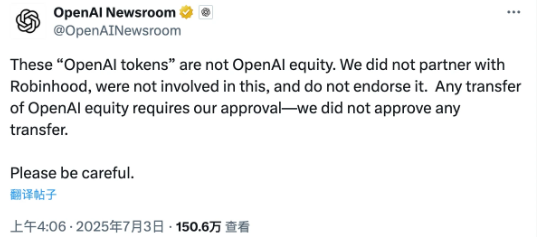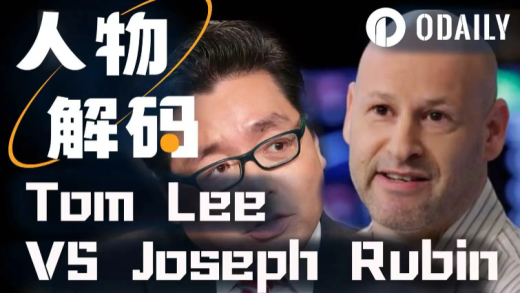
Robinhood’s Stock Tokenization Sparks Controversy: Can Unlisted Stocks Be Traded On-Chain?
In recent days, Robinhood has dominated financial headlines with its aggressive push into the “stock tokenization” market, sending its 股价 soaring past $100 to a record high. The retail-friendly platform isn’t just tokenizing listed stocks for on-chain trading; it’s also targeting unlisted private companies—planning to gift EU users stock tokens of OpenAI and SpaceX. This move is widely seen as an attempt to seize pricing power in the pre-IPO market.
OpenAI Slams: “These Are Not Our Shares!”
In the early hours of July 3, OpenAI clarified on X: “These so-called OpenAI tokens are not OpenAI equity. We have no partnership with Robinhood, did not participate, and do not endorse this. Any transfer of OpenAI equity requires our approval—and we have not approved any. Please be cautious.”
Responding to OpenAI’s public rebuke, Robinhood co-founder and CEO Vlad Tenev stated: “It’s true we’re gifting OpenAI and SpaceX stock tokens to eligible European customers. Strictly speaking, these tokens are not ‘equity’ (see terms for details), but they give retail investors access to these private assets. Since our announcement, many private companies have reached out to join this tokenization revolution.”
Robinhood’s product docs further explain: “Stock tokens track the price of publicly traded stocks and ETFs; they are blockchain-based derivatives… When you buy a stock token, you’re not buying actual shares, but a tokenized contract that follows its price on the blockchain.”
Core Debate: Is Tokenizing Unlisted Stocks Legal?
OpenAI’s criticism quickly ignited market debate, focusing on three key questions: Can shares of unlisted private companies be tokenized? Do platforms (or derivative issuers) need company authorization? Can private firms restrict such token circulation?
Expert Insights
- David Hoffman, Bankless Founder: Speculates Robinhood may have struck a deal with an investor holding OpenAI/SpaceX shares. These shares likely still belong to the original investor, and OpenAI may have approved their sale. In this case, Robinhood’s private agreement with the investor might not require further OpenAI approval.
- Rob Hadick, Dragonfly Partner: Highlights a potential risk—private companies could disavow share sale agreements as “breach of contract.” Such issues are common in secondary markets; firms aren’t obligated to recognize unauthorized share transfers.
- Lawyer Collins Belton: Emphasizes shareholder agreements may restrict “transfer,” often broadly covering pledges and derivative creation. Late-stage hot Silicon Valley startups typically impose such restrictions on all shareholders. He suspects Robinhood hasn’t resolved this legal issue—possibly “playing dumb” or truly unaware.
Given OpenAI’s mention that “share transfers require approval,” it likely has transfer restriction agreements with investors. But with Robinhood undisclosing share sources, market details remain unclear.
The Real Battle: IPO Pricing Power
The core of their standoff is the fight for “IPO pricing power.” Chen Yuetian, Founding Partner of Fire Phoenix Capital, analyzes: “OpenAI is unlisted with no IPO plans; its shares are private equity, previously inaccessible to ordinary people. But by tokenizing purchased private equity and pricing it on secondary markets, Robinhood gives the company a trading price without an IPO. With limited shares and high demand, prices will be inflated—essentially seizing IPO pricing power.”
In traditional finance, IPO pricing is led by underwriters and companies. Robinhood’s move lets private equity enter on-chain secondary markets early, allowing anyone to trade. This means price discovery occurs pre-IPO, stripping pricing power from companies and underwriters—exactly what OpenAI wants to avoid.
Retail Perspective: Should You Jump In?
Tokenizing listed stocks is familiar territory for Robinhood with a clear path. But for private firms like OpenAI and SpaceX, it’s uncharted ground with massive uncertainty.
Hadick bluntly notes: “Robinhood is extremely opaque about the derivative’s exact nature, hedging methods, counterparty (share source), and legal recourse. Private company equity derivatives lack public prices, with huge variations across securities/profit-sharing plans, and settlement rules are entirely unclear.”
For retail investors, uncertainty sometimes hides opportunities—but more often, it points to risk.
Read More《OpenAI怒斥Robinhood未经授权,股票代币化触碰了谁的利益?》
This content is AI-generated and does not constitute investment advice. Please exercise your own rational judgment.
- Startup Commentary”Three post-2005 entrepreneurs are reported to have secured a new financing of 350 million yuan.”
- Startup Commentary”Retired and Reemployed: I Became Everyone’s “Shared Grandma””
- Startup Commentary”YuJian XiaoMian Breaks Issue Price on Listing: Where Lies the Difficulty for Chinese Noodle Restaurants to Break Through in the Market? “
- Startup Commentary”Adjusting Permissions of Doubao Mobile Assistant: AI Phones Are a Flood, but Not a Beast”
- Startup Commentary”Moutai’s Self – rescue and Long – term Concerns”





